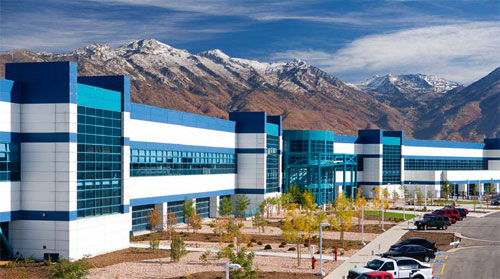Micron Technology Inc. has found a buyer for its Lehi fabrication plant. The memory-chip maker has announced that Dallas-based Texas Instruments (TI) has agreed to buy the more than 2 million-square-foot facility for $900 million in cash.
Micron had put its Utah factory up for sale in March, as it wanted cease production of its 3D XPoint memory chips that it had developed in partnership with Intel Corp. The company had expected to find a suitable buyer and reach a sale agreement by the end of this calendar year.
Micron said that the facility’s total economic value is $1.5 billion. In addition to the $900 million that TI will pay for the Lehi facility, Micron expects to realize another $600 million from sales of equipment, tools and other assets at the factory. It also revealed that it has already sold some of the assets and intends to retain additional assets to be used at its other facilities.
Micron, in partnership with fellow chip-making giant Intel, built the Lehi facility in 2006 and launched a joint venture call IM Flash Technologies. The new company began making the now-defunct 3D XPoint, a nonvolatile memory chip that was sold under the brand names Optane and QuantX. Intel and Micron initially contributed about $1.2 billion each to set up IM Flash Technologies.
In October 2018, Micron announced that it was buying out Intel’s position in IM Flash and taking control of the Lehi operation. The deal’s terms included payment of about $1.5 billion in cash, as well as Micron taking over Intel’s debt in the venture, which trade publications said was about $1 billion at the time. IM Flash became a wholly owned subsidiary of Micron.
When Micron ceased operation in Lehi and put the plant up for sale, it said it no longer believed that there was sufficient market validation that would justify the continued investment toward developing and commercializing 3D XPoint chips. The company said it intends to shift the resources used for 3D XPoint development toward facilitating market introduction of Compute Express Link (CEL)-enabled memory products. Used extensively in cloud computing, CEL products have seen soaring sales as a result of demand created by a surge in the work-from-home employees model caused by the COVID-19 pandemic.
Texas Instruments will convert the Lehi factory to manufacture its 300-millimeter wafer products, the fourth such facility for the company. Company officials said it will also be used for 65-nanometer and 45-nm production for analog and embedded processing products. Getting the factory to full capacity will take some time, a TI press release said. The company expects to spend about $75 million per quarter in 2022 until the plant begins to generate revenue in the first quarter of 2023.
“This investment continues to strengthen our competitive advantage in manufacturing and technology and is part of our long-term capacity planning,” said Rich Templeton, TI chairman, president and CEO.
“The Lehi fab is a great asset and a great team. We are excited about the engineering experience and technical skills the team brings in ramping and manufacturing advanced semiconductor processes,” said Kyle Flessner, TI’s senior vice president of technology and manufacturing.
The acquisition comes amid a semiconductor chip shortage over supply issues. During the company’s second-quarter sales forecast in April, Dave Pahl, TI vice president and head of investor relations, said inventory levels were lower than the company had anticipated. TI said the Lehi purchase will give the company greater control over its the supply chain.
TI is also building a new factory in Richardson, Texas, where equipment installation will begin in the first half of 2022 and chip production will begin in the second half. TI has more than 100,000 customers and makes products for several industries, including automotive, personal electronics and communications equipment.
“Micron’s Lehi facility has been home to a highly skilled team with expertise in all aspects of advanced semiconductor manufacturing,” Micron said in a release. “TI will offer all Lehi site team members the opportunity to become employees upon the closing of the sale and intends to deploy its own technologies at the site.”
“Micron’s facility has a strong history of technology innovation and leading-edge semiconductor manufacturing,” said Sanjay Mehrotra, Micron president and CEO “We are pleased to have reached an agreement with Texas Instruments as it is an industry leader and truly values the talented Lehi team and the capabilities this site offers to deploy its technology effectively. We are greatly appreciative of the contributions that the Lehi team has made to Micron, as well as the collaboration and engagement Micron has had with the local community.”
Based in Boise, Micron has 17 locations worldwide, including 13 manufacturing facilities employing more than 37,000. Founded in 1930, Texas Instruments employs about 30,000 in its 14 factories.








